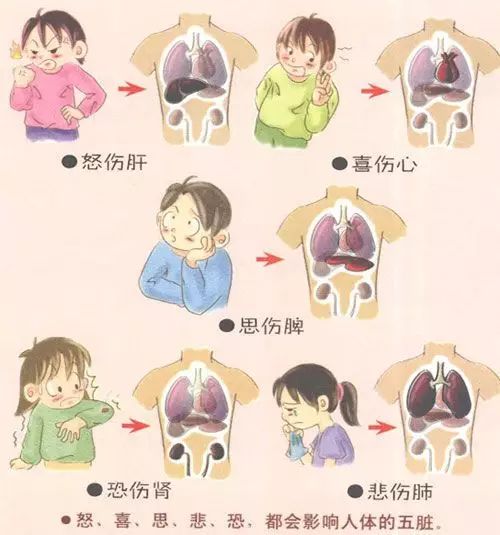【Disclaimer】The images and text are sourced from the internet. If there is any infringement, please contact us for removal!
Emotions are the responses of human consciousness to external events.In Traditional Chinese Medicine (TCM), appropriately expressing emotions is beneficial for health, but excessive suppression or expression can harm the body.To address emotional issues, we must cultivate our hearts and minds, gradually becoming aware and managing our emotions, and nurturing our character.TCM categorizes emotions into seven types: joy, anger, worry, contemplation, sadness, fear, and shock, with corresponding relationships to the five organs as follows:Excessive joy harms the heart, excessive anger harms the liver, excessive worry harms the spleen, excessive sadness harms the lungs, and excessive fear harms the kidneys.A normal person experiences slight happiness, anger, sadness, and fear in daily life without harming their body. Only when these emotions become excessive do they affect health.Emotional fluctuations can influence the flow of Yang Qi within the body, with different emotional states affecting the trajectory of Yang Qi differently. The Huangdi Neijing summarizes this as: anger causes Qi to rise, joy causes Qi to relax, fear causes Qi to descend, shock causes Qi to become chaotic, sadness causes Qi to dissipate, worry causes Qi to gather, and contemplation causes Qi to stagnate.

If one becomes angry, Yang Qi rises, which is why some people turn red in the face during intense arguments; the Yang Qi pushes blood upward, causing a sudden rush of blood to the face, resulting in redness.There is an interesting term in ancient China: “Anger raises the hair.” Hair is a byproduct of blood; when a person is angry, blood rushes to the head, causing the hair to stand up, which can even lift a hat. This exaggerated expression reflects the common understanding of this phenomenon in ancient TCM.Extreme anger can lead to acute illnesses such as stroke and cerebral hemorrhage.When blood rushes to the head, blood vessels that are already congested can easily rupture, leading to cerebral hemorrhage. Additionally, if a person is weak, the sudden rush of blood can cause them to faint, allowing cold pathogens to enter the body, resulting in paralysis.Many elderly individuals on television have died from being angered by their children, which has some truth to it. During severe illness, the body is very weak, and the last bit of Yang Qi resides in the kidneys. If a child appears and says something upsetting, causing the elderly person to become very angry, that last bit of Yang Qi can also rise, leading to a phenomenon known as “returning light” where the face turns red before the Yang Qi departs, resulting in death.Therefore, when patients are very weak or after surgery, it is important not to say anything that might provoke strong emotions.

In daily life, anger can harm the liver and gallbladder,especially for those who bottle up their anger, as it can easily lead to liver Qi stagnation.The emotion of anger actually consists of two processes:The first stage is liver Qi stagnation.When a person becomes angry about something, their body becomes agitated, causing liver Qi to stagnate immediately.The second stage is the release of that anger.When the liver detects that its meridians are blocked, it attempts to push through the stagnation, causing Qi to rise, and the person’s emotions are expressed through language, facial expressions, and actions.People who bottle up their anger remain stuck in the first stage, and their stagnant Qi cannot be released. If liver Qi stagnation occurs occasionally, it is not a major issue, as the body can self-regulate. During sleep, the body can automatically clear some negative emotions, and this stagnant Qi may be released through bodily functions, such as some people feeling better after a good night’s sleep or after massaging certain acupuncture points.Although the body has a self-clearing ability, if a person frequently bottles up their anger, this ability may not be sufficient, leading to increasingly severe liver Qi stagnation, resulting in symptoms such as fullness in the chest and ribs, loss of appetite, nausea, bitterness in the mouth, and dryness. This occurs becauseliver Qi is not smooth, and gallbladder Qi is reversed.Moreover, liver and gallbladder issues often come with gastrointestinal symptoms, as the liver and gallbladder are associated with wood, while the gastrointestinal tract is associated with earth; wood overcomes earth. Therefore, some people who experience bloating and diarrhea when angry likely have liver and gallbladder issues. By soothing the liver Qi, these symptoms can be alleviated. Many chronic stomach issues are also related to liver and gallbladder problems, which is why TCM often incorporates liver-soothing herbs when treating stomach conditions, leading to quick recovery for patients.


Subtle joy is greatly beneficial for the body.The Huangdi Neijing states: “Joy harmonizes Qi and allows the will to be expressed, thus Qi flows smoothly.” When a person feels joy, the Yang Qi in the body flows freely, and areas that were previously stagnant become unblocked, allowing previously accumulated frustrations to dissipate, resulting in a smooth flow of Yang Qi.It is important to note that the TCM concept of “smooth” does not mean slow; it refers to a state of being unhurried and steady.Once Yang Qi flows smoothly, it can better nourish the skin, which is why there is a saying, “A smile can take ten years off your age.” Those who maintain a sense of joy not only stay healthy but also appear younger. Some people say that those who laugh often have many wrinkles; however, this is not the case. Wrinkles form when muscles relax and Yang Qi is insufficient to reach the face, preventing the transport of blood and moisture. Over time, without the nourishment of blood, moisture, and Yang Qi, the skin becomes dry and wrinkles appear. For example, children who laugh often do not develop wrinkles because they have abundant Yang Qi.However, excessive joy can harm the heart.For instance, some people faint from excessive joy upon hearing they have won the lottery. Any extreme emotion can harm the body. Excessive joy can cause Qi to become not smooth but sluggish. Have you ever felt that after a hearty laugh or a moment of great joy, you lack the motivation to do anything? This is a state of lethargy that occurs when Qi slows down.


Some people turn pale after being frightened because the blood and Qi in their face descend. Others may experience incontinence due to fear, as Yang Qi descends. If a person has weak Yang Qi below, they may not be able to control their bladder and bowels, leading to involuntary expulsion of waste. This situation is more common in the elderly, as they often have weak Yang Qi.The kidneys are responsible for storing a person’s essence to support growth, bone marrow formation, and reproductive functions. However, when a person experiences excessive fear, Yang Qi descends, leading to incontinence, and the essence stored in the kidneys may also be expelled with the waste. This can result in cases where individuals die from shock.It is important to note that it is not only sudden shocks that can harm the kidneys; prolonged exposure to fear can gradually deplete the essence in the kidneys, leading to a pale complexion and lack of vitality.On one hand, this is because fear causes Qi to descend, preventing blood and Qi from reaching the face. On the other hand, prolonged fear leads to gradual depletion of essence, resulting in insufficient vitality, which causes a lack of energy and spirit.


Some sadness is not fleeting; it can last a long time, such as after a breakup or the death of a loved one. As mentioned earlier,sadness causes Qi to dissipate; when a person is in a state of sadness, their Qi will disperse.Prolonged sadness, especially when one is deeply grieving, can easily lead to Yang deficiency, weakening the body’s resistance. Some individuals who are already weak may faint from crying too much. Patients who remain in a state of prolonged sadness find it difficult to recover because their Yang Qi is continuously consumed by this emotion.When Yang Qi does not return, illness is hard to heal.Sadness can also harm the lungs, as when a person is sad, the lung Qi immediately tightens, preventing the smooth flow of Qi and the expulsion of phlegm and toxins. Over time, this leads to an accumulation of waste gases and tightness in the lung Qi, resulting in lung disease.Many ancient stories record individuals who died from excessive grief over the loss of a spouse or parent, as their Yang Qi was depleted, and evil Qi accumulated within, leading to fatal illnesses.


When a person overthinks, Qi becomes stagnant because all attention is focused on the thoughts at hand, causing Yang Qi to concentrate in the brain. This prolonged concentration of Yang Qi can lead to stagnation.Stagnation of Yang Qi in the brain can lead to insomnia.Many people experience this; when they think too much for an extended period, their minds become restless at night, leading to difficulty sleeping. Even if they do fall asleep, their minds are filled with dreams, as the Yang Qi stagnates in the brain, preventing the spirit from descending to the kidney water.When a person is deep in thought, the digestive function of the spleen and stomach is diminished because Yang Qi is concentrated in the brain. The spleen and stomach, working in a low-energy environment for an extended period, consume their own essence.Thus, many individuals who frequently think or are forced to think deeply have poor spleen and stomach function.Consider the intense study period during high school; many may have noticed a decline in their digestive function, sometimes even losing their appetite or feeling weak.The spleen and stomach are the source of postnatal Qi, as they digest food and transform it into the Qi that supports daily activities. A significant portion of Yang Qi is generated by the spleen and stomach. Additionally, the spleen and stomach categorize the essence of food according to the nutritional needs of various organs.Therefore, individuals with long-term poor spleen and stomach function may appear pale and thin, easily fatigued, and frequently ill, not only due to Yang deficiency but also because the five organs are not nourished. Thus, it is essential to balance work and rest, limiting the time spent on deep thinking, taking breaks to relax, and not fixating on a single problem, as this can be harmful to the body.


Shock and fear are often related, but shock primarily disturbs the spirit, causing unease, while fear is more about dread. Sudden shocks can leave a person unsettled, unable to focus, leading to chaotic Qi flow. When checking their pulse, it may be erratic, and the person may feel mentally disorganized.Frequent chaotic Qi flow can easily lead to blood stasisand prevent Yang Qi from properly protecting the body. It is worth noting that children are particularly susceptible to shock; after being frightened, they may cry at night or appear panicked, indicating that their spirit is disturbed and cannot settle. A small amount of Fu Shen (Poria) powder can be given to them.


The last emotion is worry,worry arises when the mind cannot balance with reality.Worry is the fear of bad things happening, while contemplation is the hope for good things to occur; both involve thinking about the future, creating a contradiction when the future has not yet arrived. Our minds can only deal with the present; if we focus on the future or distant matters, we become helpless, leading to feelings of worry.When worrying, Qi tends to gather; instead of being dispersed to protect the body, it becomes concentrated, leading to Yang deficiency on the surface, making one susceptible to illness. Living in a state of constant worry can also lead to liver Qi stagnation, which is detrimental to both the liver and spleen. In discussing how emotions can lead to illness, the aim is to remind everyone not to experience extreme joy, anger, fear, or sadness, as these are detrimental to health. While external treatments and medications can address illnesses caused by emotional disturbances,the root cause must be addressed through emotional regulation, gradually becoming aware and managing emotions, and cultivating one’s character!
In discussing how emotions can lead to illness, the aim is to remind everyone not to experience extreme joy, anger, fear, or sadness, as these are detrimental to health. While external treatments and medications can address illnesses caused by emotional disturbances,the root cause must be addressed through emotional regulation, gradually becoming aware and managing emotions, and cultivating one’s character!

Warm Reminder:This platform shares images and text for reference and learning purposes only.
⊙ Copyright Statement: The article is sourced from the internet. Please contact us for removal if there is any infringement.
Do not purchase fishing or hunting equipment, refuse to kill. Do not play violent games; the consequences of violent games are similar to actual killing. Avoid reading pornographic materials, as lust is the root of reincarnation and disaster. The law of cause and effect follows closely. Remember!
Prayers: May the world be harmonious, the sun and moon be clear; may wind and rain come timely, and disasters not arise; may the nation prosper and the people be safe, and weapons be unnecessary; may virtue and kindness flourish, and courtesy be practiced; may there be no thieves or grievances; may the strong not oppress the weak, and everyone finds their place; may no one suffer from illness, and may all enjoy wealth and peace; may longevity and virtue be cherished, and may all beginnings and endings be good.


